Barack Obama has had plenty to say about human rights in Africa over the years but the issue is glaringly absent from this week’s summit with much of the continent’s leadership in Washington.
Activists have taken to reminding Obama of his own soaring rhetoric about the one item not on an agenda that takes in trade and conflict, health and even how to combat of wildlife trafficking.
On his visits to Africa Obama has spoken about human rights with a passion rarely heard from earlier US presidents. “History offers a clear verdict: governments that respect the will of their own people, that govern by consent and not coercion, are more prosperous, they are more stable, and more successful than governments that do not,” he told Ghana’s parliament in 2009.
Obama offered a similar sentiment at a speech in Cape Town last year. But human rights issues – from a surge in laws persecuting gay people, to the suppression of political and civil dissent in key US allies such as Ethiopia and Rwanda, as well as atrocities committed by American-backed security forces in Nigeria and Kenya in their conflicts with Islamist armed groups – are strikingly absent from the formal agenda.
Sarah Margon, director of the Washington office of Human Rights Watch, said the omission was “a real problem” that raised questions about how the Obama administration “matches its really wonderful rhetoric with its policy implementation”.
“Administration officials talk repeatedly about how US policy is based on three prongs: security; trade and development; and human rights. What we’ve seen is an incredible elevation of security issues – resources going to governments throughout the continent. We’ve seen very significant elevation of the development and trade issues. We haven’t seen the equal push and elevation on human rights and the rule of law. That pillar is missing,” she said.
Obama’s deputy national security adviser, Ben Rhodes, said human rights issues would be raised in individual forums where appropriate, such as the meetings on peace and regional stability, and on governance.
“We’re committed to supporting strong democratic institutions in Africa as well as the next generation of African leaders. And so we’ll be able to discuss efforts to promote open and accountable governance and respect for human rights in Africa, which, of course, continue to be an abiding interest for the United States,” he said.
But human rights activists are sceptical. They say African leaders did not want the issue on the formal agenda and the White House did not push it because it was in conflict with focusing the summit on trade and security.
Yet human rights hangs as an unavoidable shadow over the summit, in part because of the records of some of the leaders attending, such as Kenya’s president, Uhuru Kenyatta, who is under indictment by the international criminal court over election violence.
Many African countries are politically freer, more prosperous and with better educated populations than at the height of the notorious “big man” regimes: one-party states and military rulers that followed not long after independence. But some leaders who were once seen as enlightened and enthusiastically embraced by the west as the “new breed”, and countries that claim to have embraced more democratic systems, are facing strong criticism from human rights groups.
The spread of anti-gay legislation in Africa, particularly Uganda’s law criminalising homosexual activity with a life prison sentence, has drawn wider attention in the US than usual for African human rights issues. Washington limited aid to Uganda as a result and the law was overturned by a court last week, but on narrow grounds that could see it reinstated.
Rights activists are frustrated that in such circumstances there will not be specific discussion of the rise of laws persecuting LGBT communities across the continent, as well as the increasingly authoritarian use of anti-terror legislation to suppress political dissent.
Margon said that more than a dozen authoritarian African governments were targeting civil society groups and independent media. “The trend appears to be worsening and the US has had no co-ordinated and clear response – condemning some publicly, some privately, and some not at all,” she said.
Margon highlights Ethiopia, a major recipient of US assistance because it is a key ally in the fight against al-Shabab in Somalia. The Ethiopian government has used anti-terror legislation to lock up political opponents and driven others into exile along with journalists and civil society activists. A separate 2009 law curtailed the work of Ethiopia’s leading human rights groups, forcing some to shut down and others to limit their investigations.
“Ethiopia is a good example where the US provides quite a bit of security assistance but at the same time Ethiopia has a very draconian anti-terrorism law that has never been used to charge anybody who’s committed a terrorist offence. It’s been used to charge political opponents and dissidents,” Margon said.
The Obama administration publicly criticised the Ethiopian regime in July for using anti-terror laws to prosecute 10 reporters and bloggers but Margon said Washington was doing little to get the law repealed or amended to stop it being used to suppress political activity.
The US secretary of state, John Kerry, directly addressed some of the issues in a speech to a civic society forum on Monday, but he did not name governments or specify responses. “We will continue to support press freedom, including for journalists charged with terrorism or imprisoned on arbitrary grounds,” he said.
“We will continue to stand up and speak out for civil society organisations around the world and in Africa that face attacks, that push for less onerous regulations on their work, and that struggle with restrictions on what they can do, what they can say, where they can work, how they can obtain funding. And we will continue to stand up and speak for the rights of all persons with disabilities, and we will continue to stand up and speak out for LGBT activists who are working for the day when tolerance and understanding really do conquer hate.”
Human rights activists say that public criticism has not done much to change the behaviour in US allies such as Uganda and Rwanda, which have come under increasing criticism for authoritarian leadership and military involvement in the Democratic Republic of the Congo. Although Washington has limited some aid to both countries it maintains close relationships, in part because they have relatively well trained armies that play an important part in US-backed peacekeeping operations in Africa. US soldiers are also serving alongside the Ugandan army in pursuit of Joseph Kony’s Lord’s Resistance Army.
In other countries the US’s Counter-Terrorism Partnership Fund is supporting security forces accused of crimes and lack of accountability.
Human Rights Watch has accused the US-supported Anti-Terrorism Police Unit in Kenya of disappearances, extrajudicial killings and other abuses in operations against Somalis. In Nigeria the military has been involved in questionable killings, property destruction and torture in its fight with Boko Haram.
A focus on human rights in some countries risks conflicting with the summit’s focus on trade. Groups representing political exiles from Equatorial Guinea have denounced the Obama administration for welcoming President Teodoro Obiang Nguema, who has decades of abuses under his belt including political killings, torture and the jailing of opposition politicians. His government is also deeply corrupt.
The US had no problem vocally condemning Obiang for gross human rights abuses until large oil fields were discovered in his country’s waters in the 1990s and American drilling companies moved in. Now Washington is more circumspect in its criticism.
And while Kagame faces ever stronger criticism over political repression in Rwanda, businessmen see his leadership differently. “When the American business community talk about Kagame, they talk about him from a very different perspective,” said John Campbell, a former US ambassador to Nigeria. “They talk about the lack of corruption, the efficiency of the government, its pro-business approach, rising standard of living.”
The White House has responded to criticism by asserting that the president has spoken strongly on the issue during visits to Africa in 2009 and last year. It says it has worked to protect vulnerable communities, such as gays and lesbians, to promote the rights of women and girls, and to combat human trafficking.
It says the US has poured tens of millions of dollars into strengthening the judiciaries of Ivory Coast, the Great Lakes region of central Africa and Nigeria. Obama in 2012 announced an initiative to prevent genocide and mass atrocities, calling it “a core national security interest and a core moral responsibility of the United States of America”.
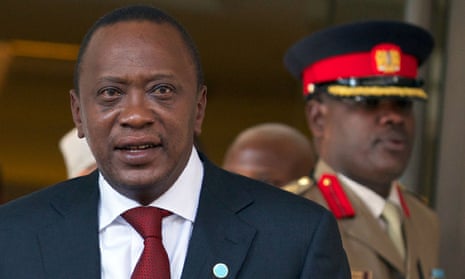

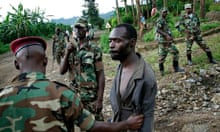
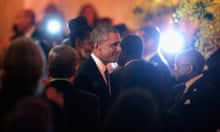

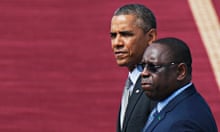
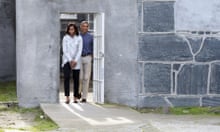
Comments (…)
Sign in or create your Guardian account to join the discussion